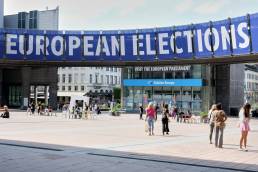In her speech at the State of the Union 2023, Ursula von der Leyen, President of the European Commission, expressed her wish for a successful enlargement of the European Union. Who are the potential candidates?
The declaration of President Ursula von der Leyen in her State of the Union Speech is just the tipping point of a process whereby enlargement is back at the centre of the EU political agenda. The Russian aggression in Ukraine has indeed changed global dynamics, pushing the EU to reconsider its hesitation towards enlargement and increase its influence in its neighbourhood. Ukraine and Moldova have recently become EU candidates while Georgia might soon follow. Although this trend might benefit the Western Balkan countries (WB6), which have been standing in the EU membership’s waiting room for years, to be realistic it will need to be backed by a strong political commitment on both sides as well as a set of institutional reforms. The latest European Council informal meeting in Grenada seems to go in this direction, with enlargement being one of the points of the discussion as “a geo-strategic investment in peace, security, stability and prosperity”.
Since 1973, there have been 7 stages in the integration of new member states. What are the criteria for joining the EU?
Any country willing to become EU member needs to comply with the 1993 Copenhagen criteria, the EU democratic standards and regulations on the rule of law and market economy. Moreover, any interested country can submit a membership application to the Council. The Commission then assess the country’s capacity to meet the above conditions and provide an opinion, upon which the Council decides to open the pre-accession negotiations. Such a process, however, can take years. In the case of the WB6, Montenegro and Serbia started membership talks in 2008 and 2009 respectively, while the European Council only agreed to open accession negotiations with Albania and North Macedonia in March 2020. Bosnia-Herzegovina was granted candidate status in December 2022 while Kosovo is still a potential candidate.
Does the EU still have the capacity to integrate more countries?
At a time of shifting global order, the inclusion of the WB6 should not represent a significant challenge for the EU, at least not greater than the enlargement towards Ukraine, Moldova, or Georgia. On the contrary, to remain relevant the EU should have the capacity to integrate more countries, if the latter are willing to. In particular, when it comes to the WB6, which are already geographically within the EU borders, the risk is indeed that other countries could eventually end up filling the vacuum left by the EU and exert dangerous influence in the EU neighbourhood. For instance, while the cost of the war in Ukraine has resulted in Russia losing some of its economic and political grip, the country can still apply forms of “sharp power” in the region through anti-EU rhetoric and propaganda. Russian influence has resulted in Serbia and Bosnia-Herzegovina not joining the EU’s sanctions against Moscow. Beyond Russia, the economic power of China, or the external influence exerted by Turkey or Saudi Arabia in some part of the region should not be underestimated either. In this respect, the European Political Community, an initiative launched by President Macron to strengthen European regional ties, might not be enough to keep those countries in line with the EU geopolitical and strategic interests. European membership is the unique valuable option.
Before COVID-19, the integration of the Balkan countries was considered too risky, both politically and economically. What has changed?
International politics has changed, shifting from a global to a regional order. In this respect, within a challenging context of sustained tensions with Russia and other powers trying to influence EU-neighbouring countries, the EU Member States and Institutions are starting to realize that for security reasons and to avoid any loss of relevance within the global arena, it is necessary to anchor neighbour countries to European progress and revamp the enlargement process.
However, these countries are notorious for not respecting the principles of the EU… Corruption, human rights violations such as crimes against the LGBTQ+ community or disabled people, limited democratic freedoms, a culture of organised crime… why and how can we imagine these candidate countries to join?
The ‘WB6’ are at different stages of democratization and need to make significant efforts in respecting EU standards, mostly when it comes to respect human rights and freedom. Yet, a realistic prospect of European Union integration is still the main engine for stimulating a social transformation in the ‘Western Balkans 6’ countries. Moreover, the lack of EU engagement would not result in the development of better social conditions and standards in the region. On the contrary, it would probably fuel radical and anti-democratic voices in a region which is at the EU doorstep.
How might this enlargement affect life within the EU and the EU’s international role? Will this new membership influence the definition of European identity?
With a population of 17 million citizens compared to the 448 of the EU, the WB6 cannot affect the life of EU citizens, even considering that already today, more than 20% of the population born in the Western Balkan Six lives abroad and many are based in the EU. In this respect, the lack of integration might negatively influence the European identity more than enlargement per se, as it will represent an unjustifiable failure of the EU as a regional power. Certainly, there are challenges the EU will have to face, for instance the need to reform its system of governance in order to make its 27+ countries cooperating more efficiently. Yet, already now, the EU institutional setting is inadequate to face internal and external challenges as it was designed for a smaller group of members. In this perspective, even without enlargement, it seems the EU will anyway need to reform its democratic institutions and decision-making process to adapt its current system of governance to an increasingly complex international order.
What are the next steps?
Considering the conflictual dynamics within the international arena, it is mandatory for the EU to revitalise the enlargement process in a credible manner, by engaging more closely with the WB6 and push forward the institutional reforms needed within the WB6. The Grenada declaration was a first important step as it highlighted a renovated EU commitment. Yet, as stated above, there are reforms the EU could also consider in order to make its own decision-making process more effective not just in view of a bigger community but also for a better functioning and more democratic Union.

Eleonora Poli is currently Head of Economic Analysys and Business Engagment Centro Politiche Europee.
Eleonora holds a PhD in International Political Economy from the Department of International Politics at City University London.
She has worked as consultant for a number of prominent international organizations and public institutions.
Dr Poli is the author of “Antitrust Institutions and Policies in the Globalising Economy”, as well as of several book chapters, opinion pieces, articles, and analyses on the EU political trends and economic policies.
More about EU-Enlargement:
Könnte Sie auch interessieren
1. Juli 2024
European Parliamentary Elections: A Debacle for Pro-EU Parties or Their Last Chance?
Between 6 and 9 June, 400 million Europeans voted in the European Parliamentary…
6. Juni 2024
What the European Elections Are Really About – And What Needs to Change
Political expert Henning Vöpel warns: On 9 June, the European elections will…
15. April 2024
Die Zukunft der Kriegsführung: KI im Gazastreifen
Technologie hat schon immer das Wesen der Kriegsführung neu definiert – heute…


